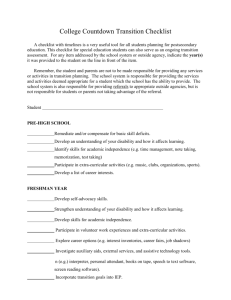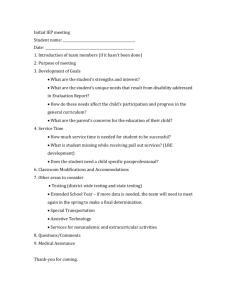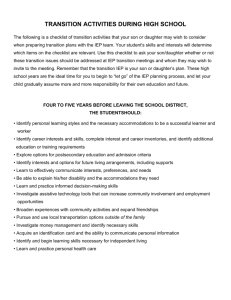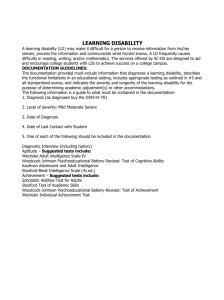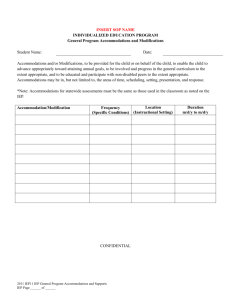Checklists for College-bound Students with Disabilities Adapted
advertisement
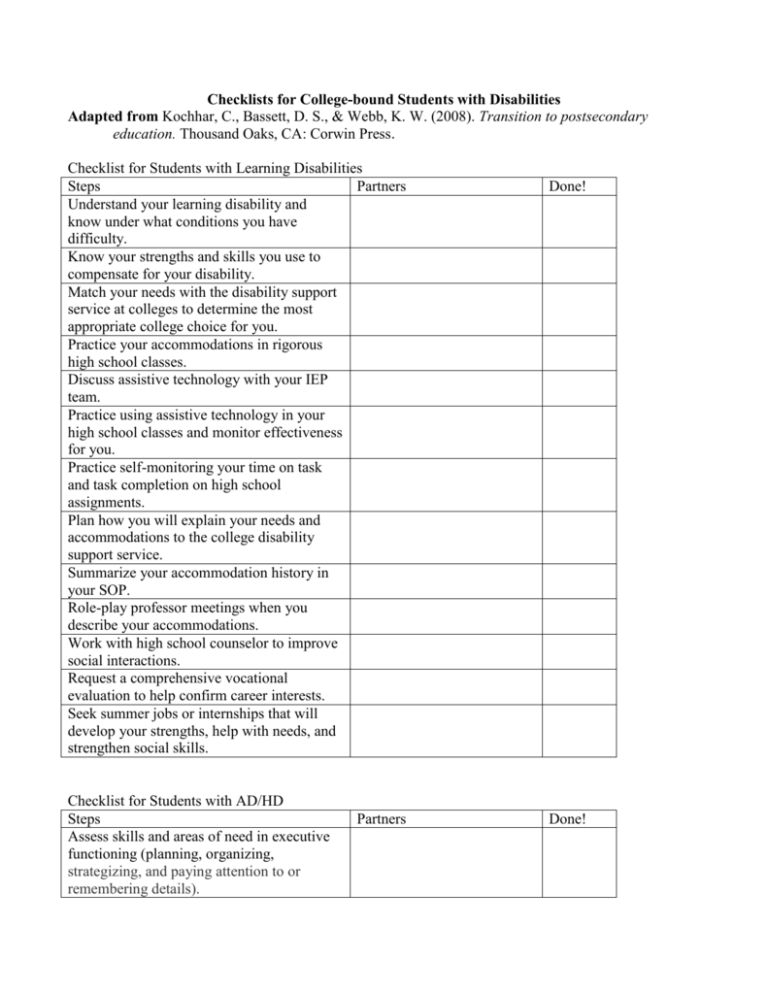
Checklists for College-bound Students with Disabilities Adapted from Kochhar, C., Bassett, D. S., & Webb, K. W. (2008). Transition to postsecondary education. Thousand Oaks, CA: Corwin Press. Checklist for Students with Learning Disabilities Steps Partners Understand your learning disability and know under what conditions you have difficulty. Know your strengths and skills you use to compensate for your disability. Match your needs with the disability support service at colleges to determine the most appropriate college choice for you. Practice your accommodations in rigorous high school classes. Discuss assistive technology with your IEP team. Practice using assistive technology in your high school classes and monitor effectiveness for you. Practice self-monitoring your time on task and task completion on high school assignments. Plan how you will explain your needs and accommodations to the college disability support service. Summarize your accommodation history in your SOP. Role-play professor meetings when you describe your accommodations. Work with high school counselor to improve social interactions. Request a comprehensive vocational evaluation to help confirm career interests. Seek summer jobs or internships that will develop your strengths, help with needs, and strengthen social skills. Checklist for Students with AD/HD Steps Assess skills and areas of need in executive functioning (planning, organizing, strategizing, and paying attention to or remembering details). Partners Done! Done! Identify and practice strategies to assist student with executive functioning. Choose appropriate strategies for tasks. Practice building faculty-student relationships with high school teachers. Build mentoring relationships in needed areas. Identify stressors and strategies to lesson stress. Practice self-selected time management strategies. Schedule appointments with college advisors and develop a schedule for ongoing appointments Identify counselors or therapists on or near college campus (if needed) Develop knowledge about the use of drugs, alcohol, prescriptions, and AD/HD. Develop a schedule for independent administration of prescriptions. Determine situations when help is usually needed and develop a plan to solicit assistance. Checklist for Students with Chronic Illness or Medical Conditions Steps Partners Investigate camps or orientations to college life for students with specific illnesses or conditions. Choose doctor(s) and health facilities in college community. Investigate insurance options and make arrangements to transfer insurance benefits. Determine housing options. Some students choose to live in single residence hall rooms or apartments to accommodate treatments or medical routines. Notify residence hall or apartment manager about any accommodations you need. Check to see that documentation for your illness or condition is current. Discuss accommodations with medical professionals. Investigate and evaluate assistive technology that may help in living or academic settings. Develop a plan to communicate with your Done! family members during time at college. Investigate parking for students with disabilities on campus. Manage dietary needs independently. Manage and administer medical routines and medicines independently. Develop an action plan in case of health emergencies. Share information with the college disability support office and student health office. Checklist for Students with Emotional Disturbances and Mental Illnesses Steps Partners Collaborate with your IEP team, mental health counselors, and vocational evaluator to choose a career path that represents your preferences and interests. Identify colleges that have an accredited counseling center. Identify colleges that have a disability support office that offers accommodations to students with emotional disturbances or mental illnesses. Identify physicians, therapists, social workers, or mental health personnel in the college community. Build a history of accommodations and justification of their uses with the help of your physician or licensed mental health counselor. Include this information on your Summary of Performance. Develop a plan to self-recognize symptoms that may signal emotional episodes of your disability or illness. Include steps you will take to enlist help of physicians, counselors, or advisors. Develop a plan to self-administer your medications and report your usage to your physician or mental health counselor. Develop a plan that includes strategies you can utilize when you are under stress. Learn about how alcohol and drugs may affect your disability or illness along with negative medication interactions you could experience. Done! Develop a strategy for building a support network of friends and advisors on campus. Think of fitness and recreational activities you would like to do while in college. Checklist for Students who are Deaf or Hard of Hearing Steps Partners Participate in comprehensive vocational evaluation that includes preferences and potential skills and abilities. Investigate colleges dedicated to students who are deaf/hh and colleges primarily for hearing students. Choose the college that meets your needs. Contact the disability support office on campus and communicate with the specialist for students who are deaf/hh. Investigate counseling services and access for students who are deaf/hh. Investigate academic support services and access for students who are deaf/hh. Learn about levels of interpreter certification at your college choices and determine your needs. Attend camps for college-bound students who are deaf/hh. Have an assistive technology evaluation to find assistive listening devices or equipment that will enhance learning. Investigate CART, C-Print, or real time captioning services to determine compatibility with student needs. Identify and practice using accommodations that enhance learning (e. g. note taker). Make requests for interpreters for class, school activities, and community events. Practice using an interpreter in a lecture class format and identify student preferences for seating. Ask questions of the interpreter if you don’t understand. Learn about levels of certification (national or state certified) among the interpreters at your college choices and determine your needs. Identify and practice with signal devices such as lighted alarm clocks, timers, doorbells, message relay systems, closed-captioning, Done! and other equipment for students who are deaf/hh. Communicate equipment needs to college housing office as early as possible after college admission acceptance. Visit college campus before enrollment and attend orientation by admission and disability offices. Checklist for Students who are Blind or have Low Vision Steps Partners Investigate summer or 2nd-year Senior college preparatory programs for students who are blind or have low vision. Investigate colleges to determine which ones meet your unique needs. Partner with community and state agencies to determine equipment appropriate for your learning. Practice with equipment to become proficient. Prepare for college entrance exams and practice using accommodations. Identify and independently order books from electronic and audio book sources. Participate in a comprehensive vocational evaluation to determine skills and areas of potential talent. Schedule appointments with specialists to assist you with mobility and orientation on campus. Communicate your needs to housing personnel. Inform housing if you have a service dog. Inform disability support office about the accommodations and equipment you need. Learn to do laundry. Learn to groom yourself. Learn to manage money and use an ATM machine. Learn to clean your room. Done! Checklist for Students with Autism Spectrum Disorder Steps Partners Investigate the variety of postsecondary institutions (e. g., community college, vocational technical school, 4-year college) Create lists of pros and cons for each of these choices. Discuss housing arrangements with your IEP team. Develop an action plan to make sure you are comfortable with cleaning, shopping, washing clothes, and cooking. Discuss eating arrangements at college (e. g. meal plans, lunch from home, cook in room). Create a book of information that includes how to operate appliances and computer, emergency numbers, daily schedule, medical information, insurance, other important information to you. Identify accommodations that assist you in your studies. Practice using accommodations in high school classes. Practice decision-making skills with real-life problems such as alcohol and drugs, sleep schedules, and peer pressure. Develop a daily schedule of your high school classes, events, and activities. Practice daily routine of getting up with an alarm clock, grooming, getting ready for class, planning exercise, and studying. Visit the disability support service on campus before you officially enroll. Choose a mentor to help you with social support. Visit the campus with your mentor. Visit the counseling center on campus and attend an orientation for that office. Attend an orientation on your campus as early as possible in order to have time to plan for this transition. If possible, attend an Open House or orientation before your senior year. Done!

